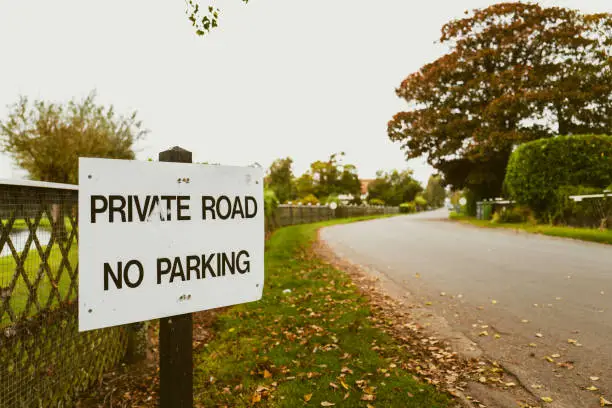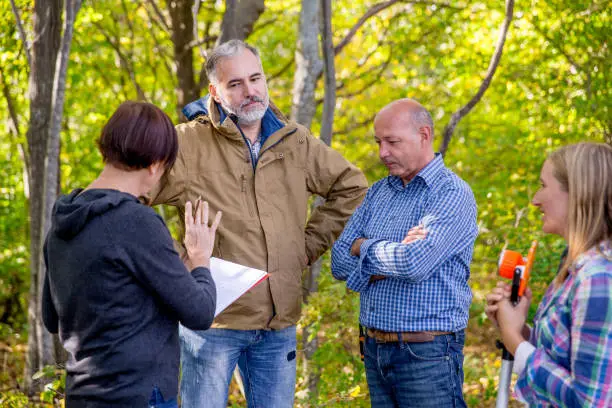The transfer of real estate through the probate process in Texas can be a daunting endeavor, particularly when private road access issues are involved. Inheriting property with unclear or disputed access can lead to legal complications, financial burdens, and strained family relationships. Unlike typical property transfers, where access is often taken for granted, properties dependent on private roads or easements require a deeper understanding of property law. Private road access refers to a situation where a property is not connected to a public road, relying instead on a private road, an easement, or a path through neighboring land. These access rights play a critical role in determining a property’s usability, marketability, and overall value. In Texas, rural and semi-rural properties are especially susceptible to these challenges, making it essential for heirs, executors, and property owners to understand how probate laws interact with private access rights.
This article provides an in-depth exploration of Texas probate law as it pertains to distributing real estate with private road access issues. We will walk through the legal framework of probate, explain how access rights are established, examine the impact on property valuation, and offer strategies for resolving disputes. This comprehensive guide aims to equip executors, heirs, and beneficiaries with the knowledge they need to navigate the probate process successfully.
The Texas Probate Process and Real Estate Distribution

Probate is the legal process of administering a deceased person’s estate, ensuring that debts and taxes are paid and that assets are transferred to the rightful heirs. While personal belongings like jewelry or bank accounts are relatively easy to distribute, real estate requires a more nuanced approach — especially if there are private road access issues.
What Is Probate?
Probate begins after an individual dies and their will is submitted to a probate court. If there is no will, Texas intestacy laws dictate how assets are distributed. The probate process typically involves:
- Filing the Will: The will is submitted to the local probate court where the deceased resided.
- Appointing an Executor or Administrator: The court appoints a personal representative to oversee the estate, often the person named as executor in the will.
- Inventorying Estate Assets: The executor identifies, values, and catalogs all assets, including real estate.
- Paying Debts and Taxes: Creditors are notified, and outstanding debts are paid.
- Distributing Assets: After debts and taxes are settled, assets are distributed according to the will or intestacy laws.
How Real Estate Is Handled During Probate
Real estate is typically the most valuable asset in an estate, making its transfer one of the most scrutinized aspects of probate. However, properties with access issues introduce a layer of complexity. Executors must resolve any legal questions about access to ensure clear title and marketability of the property. This is crucial because beneficiaries may not want to inherit a property with unresolved access issues, and potential buyers may be unwilling to purchase it.
If access issues are not resolved before the distribution of property, beneficiaries may face difficulties using, selling, or mortgaging the land. Executors are legally obligated to address any encumbrances on the property before transferring it to heirs.
Understanding Private Road Access
Private road access refers to a situation where a property is not connected to a public road but instead relies on a road over private land or through an easement. Access can be a matter of right (through legal agreements) or informal arrangements (such as historical use). In Texas, these access issues are governed by property law, which recognizes different ways to establish access rights.
Types of Private Road Access
- Express Easement: A formal, written agreement recorded in property deeds that grants access rights. It is the most legally secure form of access.
- Easement by Necessity: Created when a property is “landlocked” with no access to a public road. Texas law allows courts to establish an easement by necessity if the property cannot be used without access.
- Implied Easement: Arises from long-term, continuous use of a particular access route, even if no formal agreement exists.
- Prescriptive Easement: Similar to an implied easement, it occurs when someone uses another’s land openly and without permission for an extended period (typically 10 years under Texas law).

Challenges of Private Road Access
- Unrecorded Easements: Access may be informal, based on verbal agreements, which do not hold up in probate court.
- Hostile Neighbors: If neighbors refuse to allow access, beneficiaries may need to seek legal action to obtain a court-ordered easement.
- Maintenance Costs: Private roads must be maintained, and disputes often arise over who bears the costs.
Legal Implications of Private Road Access in Texas Probate
When an executor discovers that real estate in an estate has access issues, they must assess the legal implications. Without access, the property may be legally “landlocked,” which can significantly diminish its value.
Texas Easement Laws
Texas property law recognizes several paths to establish access to a landlocked property. The key legal concepts include:
- Easement by Necessity: If an estate property is landlocked, the executor can petition a court to grant an easement by necessity. The court must determine if the property owner has no other reasonable access to their land.
- Easement by Prescription: If a path has been used continuously for at least 10 years without interruption, an easement may be established. However, proving continuous use can be difficult.
- Formal Easement Agreements: The best approach is to negotiate and record a formal easement with neighboring landowners.
The Executor’s Role
An executor has a fiduciary duty to manage the estate in a way that benefits all beneficiaries. If road access issues reduce the property’s value, the executor must take action. This could include negotiating access rights, creating an easement, or initiating court proceedings to establish access by necessity.
Impact of Private Road Access Issues on Property Valuation
One of the most significant effects of access issues is their impact on property value. Real estate that is difficult to access is less marketable and may sell for much less than similar properties with proper access. This issue is especially important if beneficiaries plan to sell the property.
Factors That Affect Property Value
- Marketability: Buyers are less likely to purchase a property with unclear access.
- Loan Eligibility: Lenders may refuse to issue loans for properties with unresolved access issues.
- Maintenance and Legal Costs: Ongoing legal battles over access or the need for road maintenance can deter buyers.
Strategies for Resolving Private Road Access Issues
Executors and beneficiaries have several options for resolving access issues. The most effective strategy will depend on the unique circumstances of the property.
Option 1: Negotiating with Neighbors

The executor can attempt to negotiate with neighbors to establish a formal easement. If successful, the easement is recorded, providing a permanent solution.
Option 2: Filing for an Easement by Necessity
If neighbors refuse to cooperate, an executor can file a petition in court for an easement by necessity. Courts often grant these easements if the property is landlocked, but the process can be costly and time-consuming.
Option 3: Selling the Property As-Is
If it’s not feasible to resolve access issues, the executor may choose to sell the property as-is. However, this approach typically results in a lower sale price, as buyers are aware of the access problem.
Case Study: Landlocked Property in Rural Texas
Consider an estate with a 100-acre tract of land that has no direct access to a public road. The only road leading to the property is a dirt road that crosses a neighboring ranch. Historically, the property owner used this road to access their land, but no formal agreement was ever recorded.
After the owner’s death, the heirs discover that the neighboring ranch owner has placed a gate across the road and locked it. The heirs attempt to negotiate access, but the rancher demands payment for access rights. The executor files a lawsuit seeking an easement by necessity, arguing that the heirs have no other access to the property. After several months of litigation, the court grants an easement by necessity, restoring access.
Conclusion
Dealing with real estate subject to private road access issues in Texas probate can be legally and emotionally exhausting. Executors and heirs must be proactive in identifying, valuing, and resolving access issues to protect the value of the property. Access issues affect property usability, resale value, and even inheritance disputes among family members.
Understanding the types of easements, Texas probate laws, and available legal remedies is essential for a successful outcome. Executors must take swift action to address access problems, whether by negotiating with neighbors, filing for an easement by necessity, or selling the property as-is. By resolving access issues early, beneficiaries can avoid lengthy legal battles, preserve the property’s value, and ensure a smoother distribution process.
If you are dealing with access issues as part of probate, it’s wise to seek the guidance of a qualified probate attorney. Legal advice can prevent costly mistakes and help you achieve a fair resolution.








